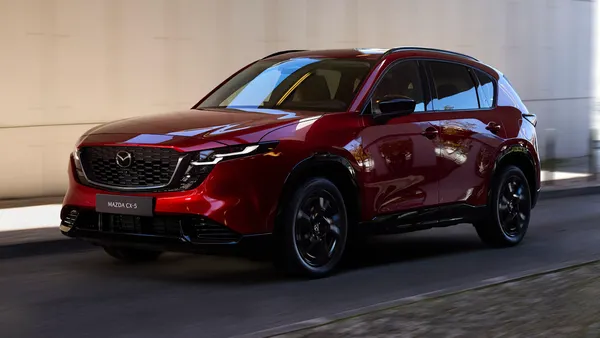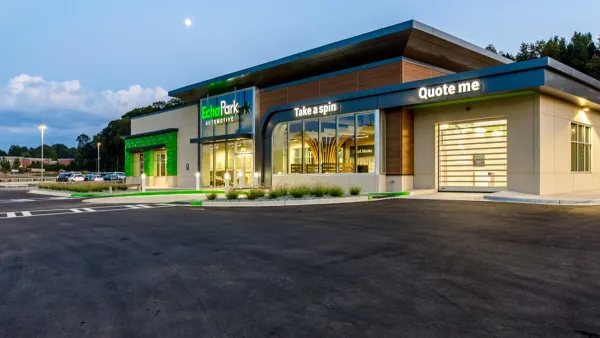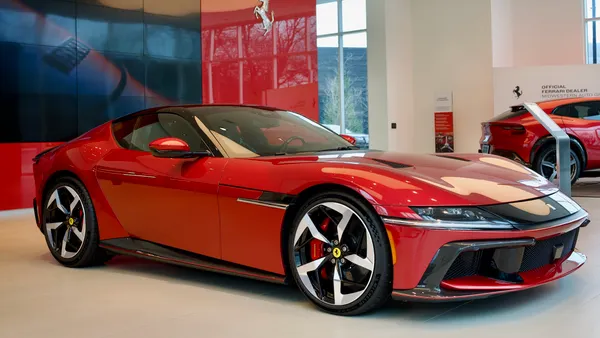Editor's note: This story is part of the WardsAuto digital archive, which may include content that was first published in print, or in different web layouts.
In a conventional car auction, a vehicle pulls into a selling lane. It gets its 15 seconds or so of fame while potential buyers bid away and fast-talking auctioneers do their bit. It’s rinse and repeat when another vehicle rolls in.
But the Manheim auction chain gradually is changing that longstanding process. It has converted three of its facilities to all-digital formats in which vehicles remain parked outside in designated spots.
Inside, they are offered for sale by an auctioneer relying on jumbo-screen monitors that show vehicle images to prospective buyers who are free to go out and see the vehicle up close. Barcode price-scanning capability and detailed condition reports also weigh in.
The new system started with the Manheim auction in Tucson. Houston and Flint, MI, auctions recently switched over. More are to come, especially because dealers seem fine with the tradition-defying process.
“We all were wondering whether dealers would accept it,” Zach Hallowell, Manheim’s vice president-digital, tells Wards. “I wasn’t sure it was going to work, and my whole career has been in digital.”
Manheim President Grace Huang cites safety as a big reason for keeping the bidding lanes free of moving vehicles.
Doing that reduces the risk of accidents, such as a porter in one vehicle hitting another, or a distracted bidder on a smartphone walking in the path of a moving vehicle in a bidding lane.
The digital auction houses are an extension of Manheim’s technology initiatives that includes online auctions that allow dealers to participate remotely.
In 2019, Manheim saw more than 150,000 unique monthly visitors to its digital channels, grew its digital lanes to 150 and sold over 2.3 million vehicles to digital buyers. That’s nearly half of Manheim’s total.
Manheim Flint began running all-digital lanes in January. It has since seen a rise in both buyer attendance and sales conversion.
“Flint dealers have been telling us that they support Manheim’s efforts to create a safer auction experience for them and our employees,” says Mandy Savage, general manager at that facility as well as Manheim Detroit to the south.
Manheim Houston’s eight-lane inaugural sale was on Feb. 25.
It had more than 903 online and in-lane bidders, with nearly half of the 982 vehicles offered for sale being sold.
The site also attracted the highest-ever simulcast attendance, with 63% of participants bidding online and 37% in-lane.
While more dealer transactions are conducted digitally, the company sees its physical sites as continuing to play a key role in its digital strategy. (Manheim Houston is third to go all-digital.)
“Participating in Manheim Tucson’s all-digital format has been a great move for our dealership group,” says Sam Khayat, chief operating officer for Jim Click Automotive Team in Tucson. “Not only did we gain efficiencies through the use of innovative technologies, but we also reaped the benefits of safety for all parties, convenience for our dealers and significant time savings.”
In addition to the three all-digital auction sites, Manheim also has been installing digital lanes at other U.S. auctions that offer traditional lanes as well. The most recent is Manheim New England.
“As we continue to accelerate the transition to digital, our key focus in 2020 remains safety, making our operations more efficient and providing the best in-lane and digital client experience,” Huang says.
Manheim began as a single-lane auction in Manheim, PA. The company on March 26 plans a 75th anniversary at that facility, which now covers 400 acres (161 ha). Owned by Cox Automotive, Manheim operates 78 physical auctions.









